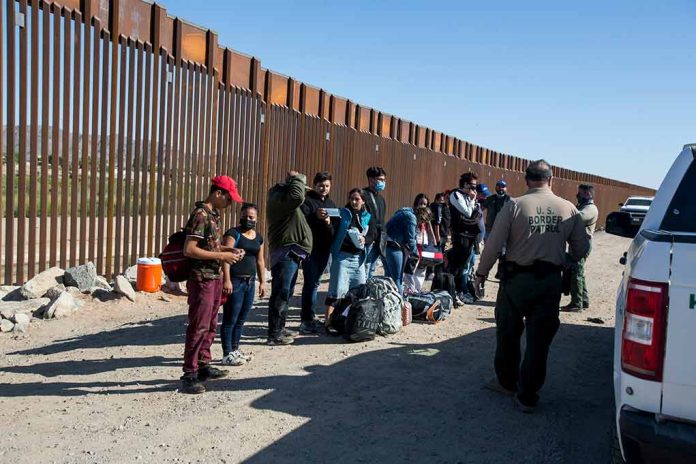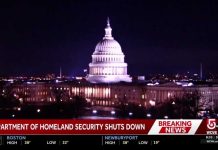
DHS Secretary Kristi Noem has officially ended the controversial “catch and release” immigration policy, directing ICE agents to arrest illegal immigrants at their court hearings as part of a sweeping enforcement strategy that marks a dramatic shift in America’s border security approach.
Key Takeaways
- The Department of Homeland Security has terminated the “catch and release” policy, authorizing ICE to arrest illegal immigrants at court hearings for expedited deportation.
- Expedited removal processes are being enforced for individuals who entered illegally within the past two years, allowing for quick deportation without immigration court hearings.
- Secretary Noem’s directive explicitly reverses Biden-era policies, implementing stricter enforcement of immigration laws to address the release of unvetted illegal aliens.
- Sanctuary cities like Phoenix are experiencing increased enforcement operations, generating protests from progressive groups concerned about family separations.
- The policy changes align with the Trump administration’s immigration priorities while navigating complex legal frameworks including the Flores Settlement Agreement.
Crackdown on Illegal Immigration Under New Leadership
The Department of Homeland Security under Secretary Kristi Noem has implemented a significant policy shift, ending the controversial ‘catch and release’ practice that allowed illegal immigrants to remain in the United States while awaiting immigration proceedings. In a bold enforcement strategy, ICE agents are now apprehending illegal immigrants at their court hearings, particularly targeting those who entered the country illegally within the past two years. This represents a complete reversal of the previous administration’s approach to immigration enforcement and fulfills President Trump’s campaign promises to secure America’s borders.
“Secretary Noem is reversing Biden’s catch and release policy that allowed millions of unvetted illegal aliens to be let loose on American streets. This Administration is once again implementing the rule of law,” stated DHS in a communication to FOX.
The expedited removal process now being enforced allows for swift deportation without requiring a hearing before an immigration judge, provided there is no active, pending case. This streamlined approach efficiently addresses the backlog of immigration cases while sending a clear message that illegal entry will not be tolerated. Individuals with valid credible fear claims will continue through standard immigration proceedings, but those without legitimate asylum claims face immediate deportation – a stark contrast to the previous policy of release into the interior.
Legal Framework and Enforcement Priorities
The ‘catch and release’ policy has been a complex immigration fixture for decades, evolving through various administrations as a collection of policies, court precedents, executive actions and federal statutes spanning more than 20 years, cobbled together throughout Democratic and Republican administrations. This patchwork approach to immigration enforcement created significant vulnerabilities in America’s border security. The Trump administration’s current strategy prioritizes detention over release, viewing the deterrence factor as crucial to managing illegal immigration while working within legal constraints.
Central to the legal framework is the Immigration and Nationality Act (INA), which allows parole for urgent humanitarian reasons or public interest. However, the administration has significantly curtailed parole usage, requiring most non-citizens to remain in detention during processing. Additionally, the implementation of the Laken Riley Act mandates detention for undocumented immigrants accused of specific offenses and empowers states to sue the federal government for non-enforcement of immigration laws – creating powerful new tools for immigration enforcement.
Impact on Sanctuary Cities and Protests
The enforcement of these stricter immigration policies has created significant tension in sanctuary cities like Phoenix, where ICE operations have intensified. Progressive activists have organized demonstrations opposing the immigration operations, claiming that the enforcement measures are causing family separations and creating fear in immigrant communities. The protests highlight the ideological divide over immigration enforcement priorities, with the administration firmly committed to upholding the rule of law regardless of local sanctuary policies.
“We have seen over 20 families separated and rushed and funneled into vans, arrested in courtrooms, and shamed,” claimed Monica Sandshaper, an activist opposing the enforcement operations.
Despite these protests, DHS under Secretary Noem remains committed to enforcing immigration laws consistently across the country. The department has made it clear that sanctuary city policies will not prevent federal immigration enforcement actions, and ICE will continue to target illegal immigrants with removal orders or those who have entered the country illegally. This firm stance represents a significant departure from the previous administration’s more permissive approach to immigration enforcement and demonstrates President Trump’s commitment to addressing what many Americans view as an invasion across the southern border.
Legal Challenges and Future Outlook
The administration’s efforts to end ‘catch and release’ may face legal challenges, particularly regarding the detention of minors under the Flores Settlement Agreement, which requires that minors be held in the least restrictive setting and released without unnecessary delay. Courts have historically upheld Flores protections, creating potential legal hurdles for implementing some aspects of the new enforcement strategy. This tension between policy objectives and legal frameworks represents an ongoing challenge for the administration’s immigration enforcement agenda.
Despite these potential challenges, Secretary Noem and the DHS remain committed to reversing what they view as dangerously permissive immigration policies of the previous administration. By targeting recent illegal entrants for expedited removal and arresting illegal immigrants at court hearings, the department is demonstrating a commitment to restoring order at the border and within the immigration system. For Americans concerned about border security and the rule of law, these policy changes represent a welcome shift toward meaningful immigration enforcement and national security.




